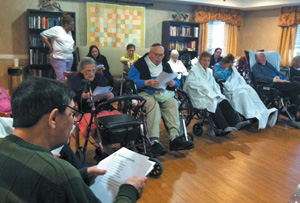

Teaneck—Volunteer pianist Roby Langert witnesses a phenomenon firsthand every week at the CareOne nursing home in Teaneck. Patients locked in silence or lost in the maze of dementia find some memories when they hear the music she plays for them, music that rouses happy reminiscences and good feelings.
About 25 nursing home residents are there on this snowy day, at first mostly oblivious or sleeping. But as Langert launches into the familiar Hatikvah, there is a gradual, but perceptible reaction. Nodding heads jolt awake, eyes widen.
Since she retired from a small business almost three years ago, Teaneck resident Langert has been sharing her musical talents and engaging personality with the long-term care and rehab residents. “I do it to give back, but I get so much more,” said Langert. “They look forward to it, and so do I. They’re transformed into another world.”
Langert has been playing piano since she was a young child, and when her own father went into a nursing home, she would play for him during their visits, drawing crowds of listeners. Langert says, “I always said that when I had more free time, I would do this to make people happy.”
Aging and disease can make expression difficult. Elders with memory loss brought on by conditions such as Alzheimer’s disease often lose the ability to verbalize their thoughts and feelings and to understand spoken communication. When words alone make little sense, music can become an effective means of communication. In some cases, individuals no longer speak, but they can sing. The profound power of music has long been recognized across cultures as a means of expression when there is no other, and as a language that bridges cultures and generations. This power grows as we age. To the elderly, music can be a vehicle of reminiscence, such as when an old song brings back the vivid memory of an experience from the distant past—a memory resplendent with not only the story, but the senses and the mood. Our memories are imprinted with music, which helps us to define our lives.
It’s inspirational to see patients begin to talk, smile, sing, and even dance, if only for a few moments. Langert is deeply moved when she hears comments like “this made my day,” or when a frail resident who could not communicate in English broke into “Avinu Malkenu” with a big smile. One man, during an impromptu game of “Name That Tune,” said proudly, “I love this because I’m a real expert at this.” Roby Langert makes him feel that way every week.
By Lisa Matkowsky










